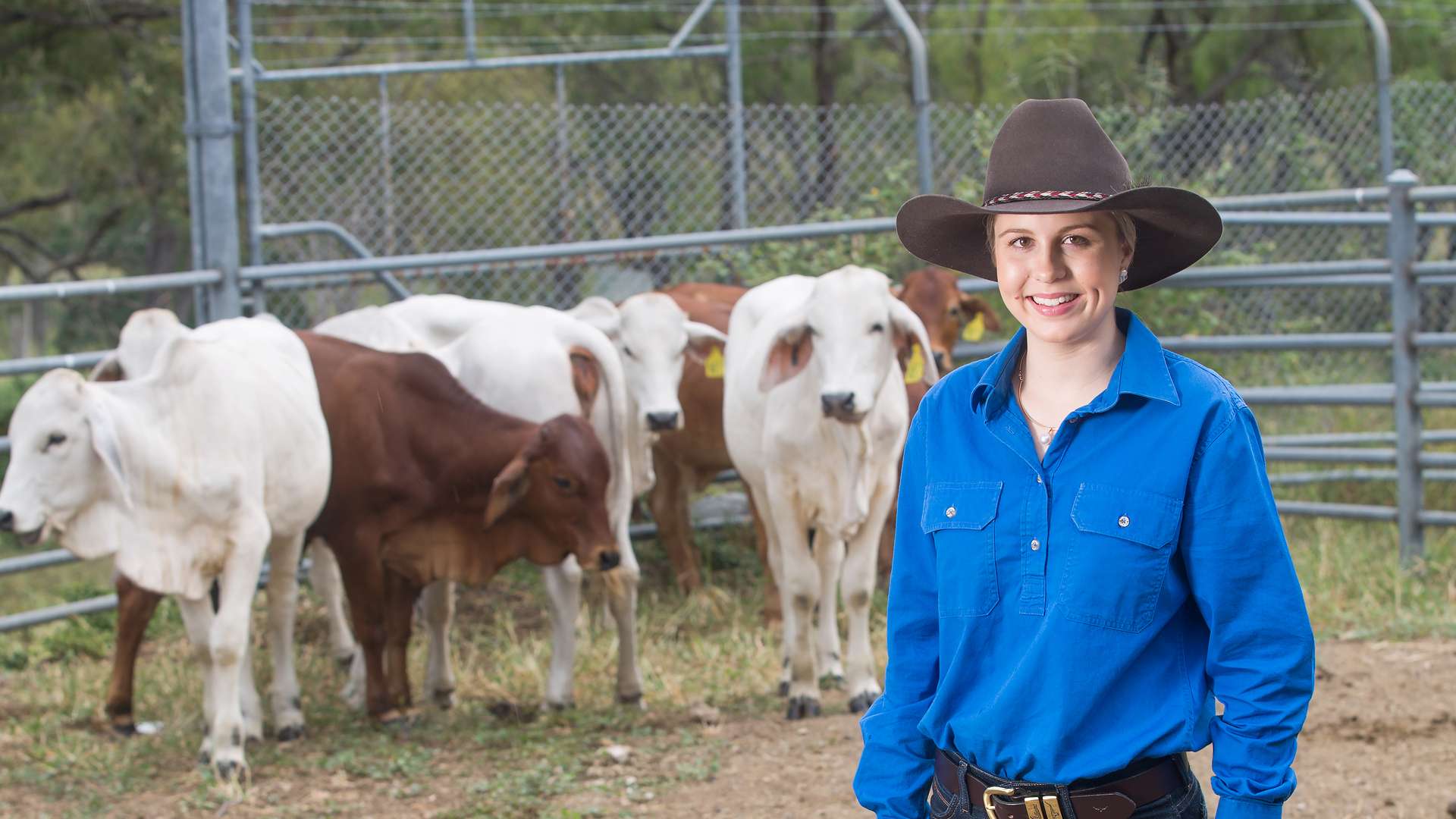
Based in the Beef Capital of Rockhampton, our team is looking forward to sharing the latest insights, technologies, and education pathways with visitors to Beef Australia 2024. Here’s how you can connect with our team!
CQUniversity is once again a proud supporter of Beef Australia, hosting a number of activities, including a property tour, seminar and Trade Stall.
Visit our Central Queensland Innovation and Research Precinct for a behind-the-scenes look at the latest in livestock technologies.
Visit the Beef Australia Property Tours Page for more information and to secure your tickets.
Hear from a panel of industry speakers as they discuss their diverse roads to success, including the financial rewards on offer, the huge variety of jobs to choose from, and the ability to travel across Australia and around the world. With 172,000 jobs currently available, there’s never been a better time to upskill and carve out an exciting and rewarding career in Australia’s agriculture sector.
You can book your free ticket to join us through the Beef Australia Seminar Program Page.
You'll find the CQUniversity booth in the Robert Schwarten Pavilion at site R22-23.
Come and chat to our experts from a range of study areas and find out what CQUniversity can offer you.
Check out our Ask an Expert Program to help plan your visits to the CQU stall.
To book tickets visit the Beef Australia Program Overview or to find out more information on the event visit Beef Australia 2024.
Join us at the upcoming Beef Australia Career Chats which provides young professionals working in Ag to provide participating students an insight into their career journey through the ag industry, highlighting the diverse range of career options available in agriculture and real-life career pathways into the industry.
Visit the CQU at Beef Australia Career Chats page for more information.
Our Precision Livestock Management (PLM) team is recognised as an international leader in the field of tropical livestock research.
Professor Mark Trotter is a leading researcher in the field of precision livestock management. With hands-on experience in the dairy and beef industries and a background in agribusiness, he brings a practical business emphasis to livestock research. He focuses on developing sensors and management systems that improve the production, efficiency, and sustainability of grazing livestock systems. Mark leads the Precision Livestock Management Group at CQU. He is a Fulbright Scholarship recipient and holds adjunct appointments at The Ohio State University and Oklahoma State University.
Ruminant nutrition researcher Simon Quigley is a Professor of Livestock and Animal Science in the Precision Livestock Management team. He leads CQ University’s delivery of a collaborative research capacity-building program with Sam Ratulangi University (UNSRAT) in Indonesia. Having worked primarily with beef cattle and more recently with goats, Professor Quigley’s research track record has contributed to improved nutritional management to increase the productivity of ruminants across a range of production systems and environments. He also has active research interests in understanding the underlying biology.
Dr Karen Harper is an Associate Professor in Agriculture in the School of Health, Medical and Applied Sciences at Central Queensland University. Karen is also a member of the Institute for Future Farming Systems and Precision Livestock Group at CQU. Karen is a ruminant nutritionist and her research has focused on tropical pastures and environments.
Karen has also worked on a number of ACIAR funded international research projects in Indonesia (Straw cow, More beef), Myanmar and across Africa, in either an administrative/management role, or as project leader. She is strongly motivated in building successful teams and building the research capacity of students and scientists and improving the livelihoods of smallholder farmers in developing countries.
Karen grew up in the heart of the Lockyer Valley in south-east Queensland. Here she gained experience in cattle production systems and horticultural production. Her passion for agriculture led her to study agriculture at The University of Queensland. She went on to complete a Masters of Agriculture Science (1991 –1996) in Microbial protein production in sheep consuming low phosphorus diets and her PhD (2008 - 2011) in The association between rumen microbial protein production with rumen microbial community structure. She went on to complete a postdoctoral fellowship in Indigestible NDF assessment of tropical forages and then worked in the teaching space while working on international development projects in Myanmar, Indonesia and Africa. Dr Harper's goal is to find innovative solutions to livestock industries in Australia and overseas.
Dr Jaime Manning is a lecturer in Agriculture at CQUniversity Australia and an Advance Queensland Industry Research Fellow. Jaime's main research interests are using and incorporating technology on-farm to improve the level of monitoring and welfare of livestock, whilst providing invaluable information into how we manage livestock and detect issues as they arise in extensive production systems. Currently, she teaches animal production, behaviour, welfare, and new and emerging technologies and is also working with the Australia Wool Innovation testing smart sensor ear tags for predation and disease detection in sheep.
Dr Lauren O’Connor is a Senior Research Officer with the Precision Livestock Management team. Lauren completed undergraduate and postgraduate studies at the University of Sydney before joining CQU in 2014 to complete her PhD. Lauren’s research has focused on relationships between animal behaviour and productivity and the use of technologies to capture research data. Lauren is currently involved in projects that are developing remote monitoring systems across various cattle production systems.
Dr Diogo Costa is a Senior Research Officer with the Precision Livestock Management team, working on technology for sensing calving and calf loss. In 2021, Diogo was also awarded a prestigious Advance Queensland Industry Research Fellowship to evaluate dietary supplements that reduce methane emissions by using cutting-edge technology to efficiently add these compounds into livestock water supply. Diogo has a background in pasture agronomy and animal production with an emphasis on ruminant nutrition.
Dr Thomas Williams is a researcher in the Precision Livestock Management team. His research has focused on established and developing industries, assessing the interactions between parasites, wildlife hosts, farming practices, and livestock disease. More recently, Thom’s work has investigated novel therapeutics and point-of-decision diagnostic tools for improved cattle health and production outcomes in extensive and intensive systems. He now works on the development of remote monitoring technologies for the northern beef industry to enable evidenced-based outcomes in remote and rugged environments.
Dr Cara Wilson is a Senior Research Officer within the School of Health, Medical and Applied Sciences at CQU. In 2020, Cara obtained her PhD from Charles Sturt University, in which she investigated the epidemiology and impacts of hydatid disease (Echinococcus granulosus) on the Australian beef industry. Cara’s main research interests are animal health and welfare within livestock production systems and using technology and data collection to monitor and manage these. She has a passion for conducting research that provides practical and sustainable outcomes to industry.
Dr Anita Z. Chang is a Senior Postdoctoral Research Fellow with the Precision Livestock Management team. Anita completed a Bachelor of Animal and Veterinary Bioscience (Hons I), majoring in Animal Production Science at The University of Sydney in 2017. More recently, Anita obtained a PhD in Precision Livestock Management from CQU, with a thesis entitled “The remote, autonomous detection of calving and calf loss using on-animal sensing systems”. Anita has expertise in data analytics, livestock biomechanics and behaviour, and research in extensive grazing environments, and is an active collaborator with researchers in the United States. Her research interests include precision livestock management, cow-calf interactions, and livestock behaviour.
Dr Priscila Bernardes is a Senior Postdoctoral Research Fellow with the Precision Livestock Management team. Priscila completed her PhD in Animal Breeding and Genetics at Sao Paulo State University in 2018. She is currently working on the Decide & Thrive project focused on supporting producers in making selection and culling decisions into, during and out of drought. Priscila’s main research interests are precision technologies, statistical analysis of animal science, and pedigree, quantitative and genomic analyses.
David has been working in the international livestock research for development space for over 15 years. He was initially given an opportunity to work in Pakistan managing a research project focussed on dairy extension. This led to a three-year role based in Lahore coordinating research activities, data collection and capacity building of local employees and field officers. The success of this program led to additional funding, building on the previous work and also in terms of project size. David’s latest project in Pakistan (2015-2022), looked at ‘Improving smallholder dairy and beef profitability by enhancing farm production and value chain management’ and aimed to integrate project recommendations into policy discussions and national extension programs.
This research is now linking into new opportunities for understanding dairy systems in Indonesia. David’s new role at CQU continues from his previous research in the development space and is now leading a multi-disciplinary team on a 5-year project (funded by ACIAR) named; “Evaluating Service Provision Approaches and Value-Chain Interventions to Support Milk Cooperatives to Grow the Smallholder Dairy Sector of Indonesia (IndoDairy 2)”.
As part of this project and others, David has a keen interest in digital data collection and collaborating with social researchers to modify his team’s approaches to improving the engagement and information flow between farmers and researchers.
Jenny is a researcher with the Precision Livestock Management team. Jenny has an undergraduate degree in Veterinary Science, master’s degree in veterinary public health management, and a PhD which investigated sheep parasites through farm and abattoir studies. Jenny is currently working on an Australian Centre for International Agricultural Research (ACIAR) funded project called IndoDairy 2. It aims to evaluate service provision approaches and value-chain interventions to support milk cooperatives to grow the smallholder dairy sector of Indonesia. This builds on her prior experience working on similar international agricultural research for development projects in Pakistan and Myanmar. She aims to co-design research with local communities and multidisciplinary teams to support local ownership and impactful practice changes. Jenny works part-time and remotely with the Precision Livestock Management team from Canberra.
Amy commenced a post-doctoral fellowship in ruminant production systems in the PLM team at Central Queensland University in 2024. With a varied background in aquaculture, poultry, animal pharmaceutical and red meat industries, Amy arrived at CQU having most recently completed her PhD in 2024 at Charles Sturt University where she explored the effect of breed and mating season on ewe management and potential enterprise profitability and risk across southern Australia. Amy has a keen interest in ruminant nutrition and management practices and the application of this knowledge both in Australia and developing countries.
Meg Anderson is a technical officer in the Precision Livestock Management team. She studied a Bachelor of Applied Science at the University of Queensland, where she Majored in Animal Science. Following graduation Meg worked as a Stockwoman for many years, before shifting into an Agricultural Extension role for a Natural Resource Management Group in Central Queensland, where she honed her skills in beef extension and grazing land management. Meg now supports the PLM team across a range of projects, from Silvopastoral trials in north Queensland, to sensor-based behavioural data collection and drought preparedness.
Jane Barker is an adoption officer in the Precision Livestock Management team. She studied a Bachelor of Applied Science at UQ, specialising in rangelands management. Her industry experience is in beef cattle, agritourism and agribusiness analysis. Jane looks to improve agritech systems and adoption to strengthen our industries responsiveness to variability.
Jonathan Reid is a PhD student at CQU within the School of Health, Medical and Applied Sciences. His PhD is investigating the detection of oestrus using sensor technologies within extensive beef production to provide producers with a greater understanding of key fertility parameters. Jonathan completed a Bachelor of Agricultural Science (Honours), majoring in animal science in 2021. His honours thesis involved using near-infrared spectroscopy to identify feed efficiency performance in tropically adapted steers using tail hair samples.
Justin Macor is a PhD candidate within CQU’s school of Health, Medical and Applied Sciences. Justin’s research investigates the possibility of detecting difficult calving events in extensively grazed beef cattle using on-animal sensing technologies. Justin completed a Bachelor of Agricultural Science (Honours) at the University of Queensland and majored in plant science after completing an Honours thesis that investigated the long-term changes in pasture composition under different grazing strategies.
Tek Raj Awasthis is a PhD student at CQU. His research project is focused in developing simulation modeling tools to enhance the genetic progression of cattle. Tek has completed a Master of Science (Microbiology) from Tribhuvan University, Nepal in 2015 and a Master of Science (Computer Science) from Federation University, Australia in 2019.
Carlos Maglietti is a PhD student with the Precision Livestock Management team. His research project is focused on the productive evaluation of automated weighing and feeding systems in Australia. Previously, Carlos worked as a researcher in the animal nutrition and meat quality group at Argentina’s National Institute of Agricultural Technology (INTA) on topics such as the effect of nutritional management on meat quality, intensive cattle fattening systems, and the use of emerging technologies in livestock systems.
Water-based livestock methane mitigation
The ‘Water-Based Livestock Methane Mitigation’ project will examine a range of methane-reducing compounds determine if they can be safely and effectively be delivered to cattle via automated water systems to decrease enteric methane emissions. The compounds will be delivered in the same way as fluoride is added to human drinking water or as additives are mixed in fuel for engine efficiency – measured doses dissolved in the water supply via automated technology.
Minimising calf loss in Northern beef herds
Calf loss costs the northern Australian beef industry more than $53ma year. This project will use precision livestock devices to monitor cows before and after calving to better understand how behaviour impacts calf loss in northern Australia. It uses GPS to track distance travelled, accelerometers to measure activity levels and thermometers to detect heat stress. This information will allow researchers to understand how environmental factors like shade, wild dogs and water availability impact cow behaviour and what it means for calf survival. This research is one part of a wider project called ‘CalfAlive’, a collaboration between University of Queensland, Queensland Alliance for Agriculture and Food Innovation and more than a dozen producer partners across northern Australia.
Increasing the uptake of performance recording genetics through automated livestock management systems
The future for genetic improvement in northern Australian beef herds requires more cattle to have more accurate, more frequent and more reliable performance measures. But in the extensive beef production systems typical of northern Australia there are significant costs associated with performance recording – this means that genetic improvement programs need to capture data at lower costs and with less labour.
This project is consolidating a range of technologies, algorithms and data management systems that have the potential to be used to automatically record cattle performance. This will provide the starting point for cattle producers to begin exploring a whole of business approach to automated data capture and analyses tools.
Automated livestock management systems (ALMS) for Argentinian production systems
We are working with Argentina’s National Institute of Agricultural Technology (INTA) and Latin American producer group CREA to trial the DataMuster walk-over-weigh system in Argentinian cattle operations to support improvements in on-farm productivity.
The project has identified enhancements to ALMS in order to customise these systems to Latin American beef production systems, while also building the capability of INTA to service the Argentinian industry in the area of ALMS.
Throughout the research project we have been working with Argentinean producers to participate in the trial and promoting trial results to the Argentinian industry.
Belmont Research Station
Owned by producer-group AgForce, the 3260-hectare “Belmont” is located 37km north of Rockhampton on the Fitzroy River. It delivers a unique collaborative approach by providing the ideal environment for research into livestock production in the tropics and sub-tropics of northern Australia, along with facilities for research and education. The station’s research and breeding program officially began in 1953 to develop new tick-resistant cattle breeds to replace the British Hereford and Shorthorn cattle herds, which then dominated grazing in northern Australia.
Central Queensland Innovation Research Precinct (CQIRP)
This facility originally opened in 1981 as the CSIRO JM Rendel Laboratories with work focussed on the tropically adapted cattle breeding. The labs operated in conjunction with CSIRO’s field research at nearby Belmont Research Station. They were named after James Meadows Rendel who moved from England to Australia in 1951 to join CSIRO and was appointed Chief of the Division of Animal Genetics in 1959. The JM Rendel labs closed in 2009 following Federal funding cuts to CSIRO. In 2011, CQUniversity invested $6M to purchase the facility and restore it to working order, with work focussed on agriculture, water and environmental management. A further $2.8M has since been invested in refurbishing and equipping the CQIRP precinct, including two new wet labs and two new dry labs, and back-up power to provide an emergency response centre for the campus.
The Central Queensland Livestock Centre of Excellence is a research partnership between CQUniversity Australia, AgForce Queensland, the Queensland Department of Agriculture and Fisheries (DAF) and the Fitzroy Basin Association (FBA).
Our focus is to:
We are unique in our ability to bring together the industry’s first integrated group of beef research sites in Central Queensland, encompassing the cattle production chain from stud, breeder and finisher operations and headquartered in the Beef Capital of Rockhampton.
Our research activities are framed by extensive producer engagement and projects are designed to include producer participants to guarantee the relevance of our solutions and encourage adoption.
Producers are involved from the start with producer-owned cattle used during proof of concept phase at the 'hubs', before technologies are deployed to private 'spoke' properties which act as remote demonstration sites for cattle communities to test systems in their own environments.
Improve the productivity and sustainability of one of the most essential industries with a Bachelor of Agriculture from CQU. Available on campus and online.
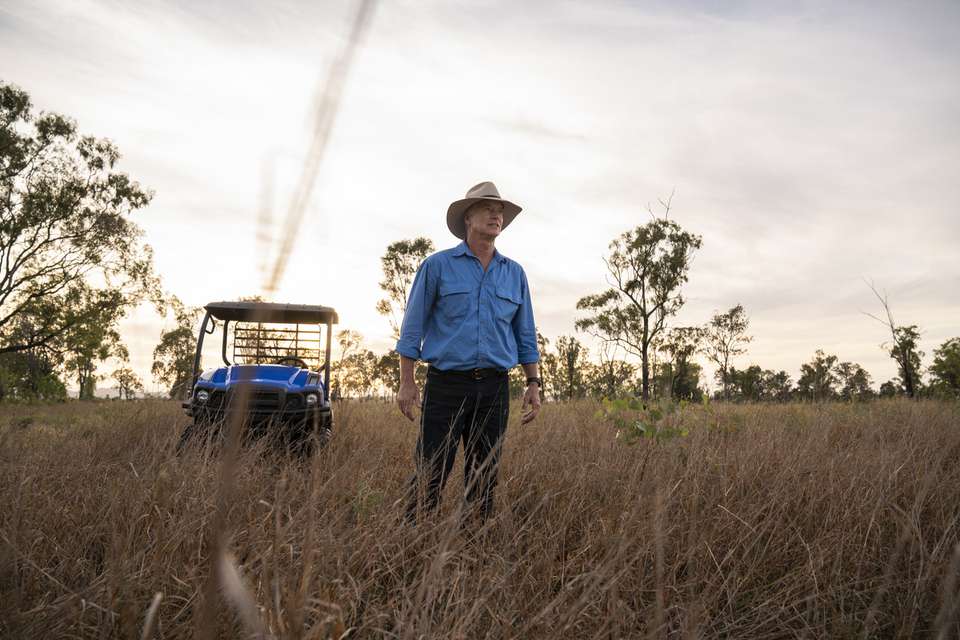
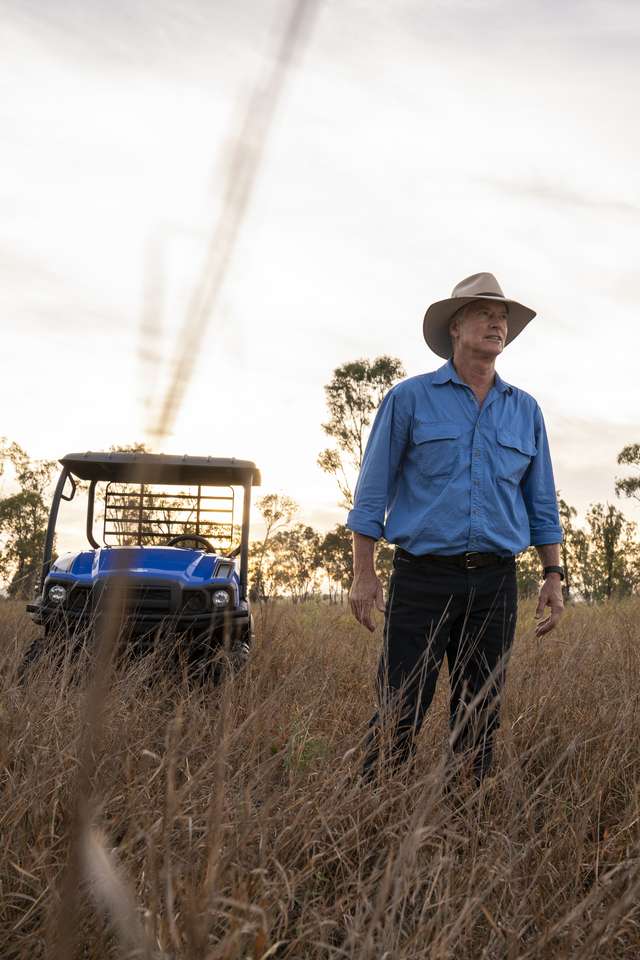
Our agricultural research program is a world leader in delivering practical solutions that bolster the productivity, profitability and sustainability of the livestock and horticulture sectors.
Driving adoption of new farming practices and technologies by changing the way end-users engage with information by combining innovative methods of education, behavioural psychology and mass communications.
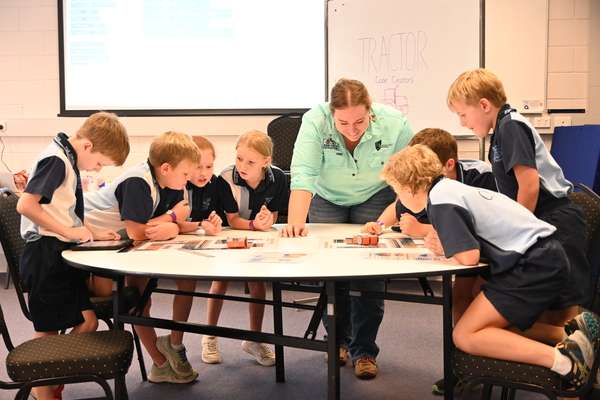
CQUniversity’s Non-Invasive Sensor team has led the world in the use of near infrared spectroscopy for assessing horticultural produce.
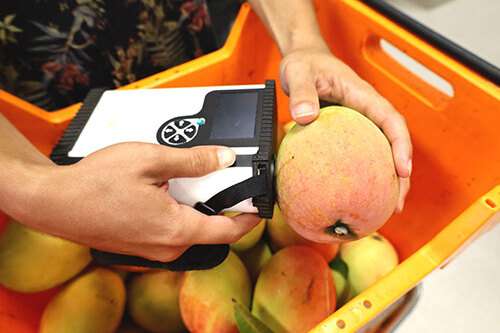
CQUniversity’s Precision Horticulture team is focussed on improving the productivity and profitability of Queensland’s major horticultural commodities.
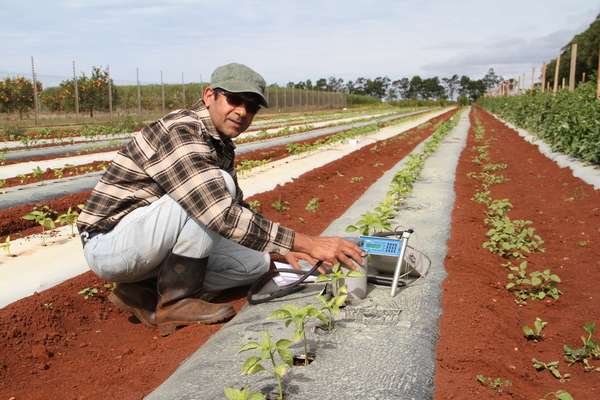
CQUniversity Australia is a trading name of Central Queensland University
ABN: 39 181 103 288
RTO Code: 40939
CRICOS: 00219C
TEQSA: PRV12073